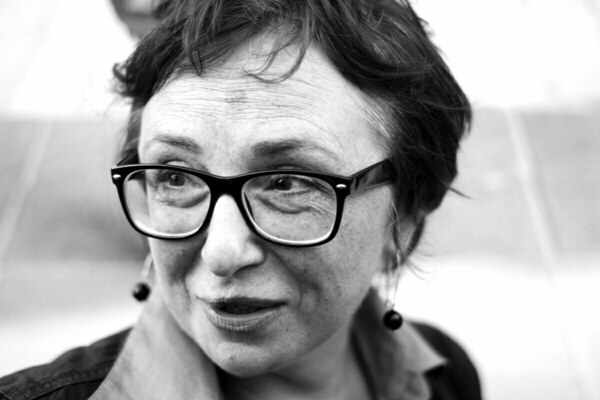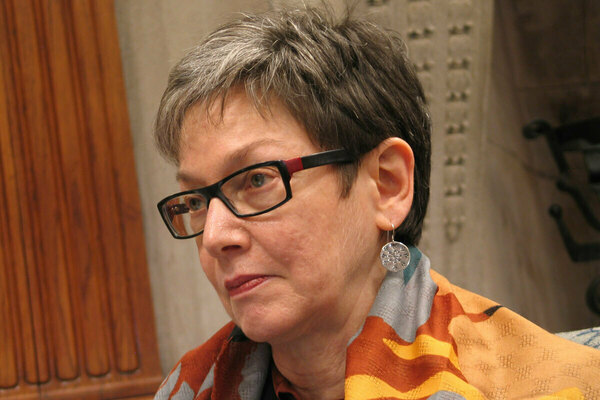
Emily Wang is an assistant professor of Russian in the department of German and Russian languages and literatures at the University of Notre Dame and a faculty fellow of the Nanovic Institute for European Studies. In October 2022, Wang organized a translation workshop with Professor Stephanie Sandler, supported by a “Beyond the Classroom” grant from the Nanovic Institute for European Studies, for students studying Russian journalism and language.

On Friday, November 11, 2022, students from Notre Dame’s “Russian Journalism” and “Advanced Russian” classes gathered virtually with Stephanie Sandler, Ernest E. Monrad Professor of Slavic Languages & Literatures at Harvard University and a distinguished scholar and translator of Russian poetry. The topic at hand was the work of Elena Fanailova (1962 – present), an opposition writer and journalist. Sandler has been translating her since 2008.
After introducing Fanailova, Sandler presented students with one of the poet’s most recent pieces to translate. It was published on social media, where much Russian-language poetry now circulates. This piece, like most of Fanailova’s recent writings, appears in both Ukrainian and Russian, a symbol of solidarity with Ukraine during the latest phase of the Russia-Ukraine War. Fanailova is fluent in both languages: her grandmother was Ukrainian, and she has translated the poetry of Ukrainian writer Serhiy Zhadan into Russian, though by her own account, she is capable of describing things in Russian that she cannot describe in Ukrainian. Indeed, this piece is very different from her early virtuosic Russian-language poetry: it is emotional, accessible, and directly engages the audience. Using a different language has made her a different poet.
How did Fanailova’s choice of language and medium give this work its shape? And how does translation change it? Since the original was bilingual, students agreed to preserve both the Russian and the Ukrainian in the English translation. They also decided to keep the hashtag, which served both an organizing function and a symbolic one, drawing attention to the work’s digital birthplace. From there, the group pondered their options: was it better to translate “всё” as “everything is,” “all of it is,” or “it’s all?” Was it better to repeat the word “terrible” (ужасно), which appears in the Russian text twice, or would that sound unnatural in English? Though the most literal translation of “невероятно” was “unbelievably,” “unbearably” conveyed the sense of carrying a burden, which connected to the image of God and Fanailova taking loved ones by the hand. (In a later post, Fanailova links this image to an idea from World War Two-era German theologian Dietrich Bonhoeffer, who opposed the Nazi regime: God could not transform evil into good but could offer the suffering comfort by taking them by the hand.) For translators, every decision involves a trade-off.

Students had the opportunity to use Russian in a new way: translation fosters intimacy with the target language, challenging one to think carefully about how the language of the original works. This workshop also gave students a unique perspective on how texts circulate in the context of the war. In the Russian Federation, all independent news media has been blocked or shut down, though it is accessible to some through VPNs and social media. The burdens of cost and censorship have also led poets to share their works online, rather than in traditional print venues. Moreover, as we have all learned since the beginning of the Covid-19 pandemic, the internet bridges physical distance. Through the web, Russian-speaking readers from all over the world can encounter the same texts together. Fanailova, once perceived by some as a poet writing only “for a narrow circle,” embraces these circumstances by addressing her readers directly.
The translation was completed by Valentin Matveev, a senior with a major in international economics (Russian) and a minor in accounting. "I really enjoyed the translation workshop. I learned that a translation must be accurate not only in meaning but also in mood and temperament," says Matveev. The final version appears below:
The text below is translated from Russian and appears above the Ukrainian as it did in the original Facebook post by Elena Fanailova on Oct 31, 2022.
#Formylovedones All of it’s terribly difficult, unbearably hard. I also have questions for God, but I hold off from criticism and believe, that He holds each and every one of us by the hand in our most horrible moments. By the hand, I hold all of my loved ones through their suffering, at times unbearable, in their hardships, of which we knew nothing before. As long as I live, it will be so.
#Замоїхулюблених Жахливо важко все, неймовірно важко. Питання до Бога також є, але я стримуюсь у критиці і вірю, що Він тримає кожного з нас за руку в найжахливіші моменти. Тримаю за руки всіх своїх коханих у стражданнях, часом нестерпних, у випробуваннях, яких ми раніше не знали. Поки я жива, то буде.
#Замоихлюбимых Ужасно трудно всё, невероятно тяжело. Вопросы к Богу тоже имеются, но я сдерживаюсь в критике и верю, что Он держит каждого из нас за руку в самые ужасные моменты. Держу за руки всех своих любимых в страданиях, порой невыносимых, в испытаниях, которых мы раньше не знали. Пока я жива, так будет.
Originally published by at nanovic.nd.edu on December 07, 2022.